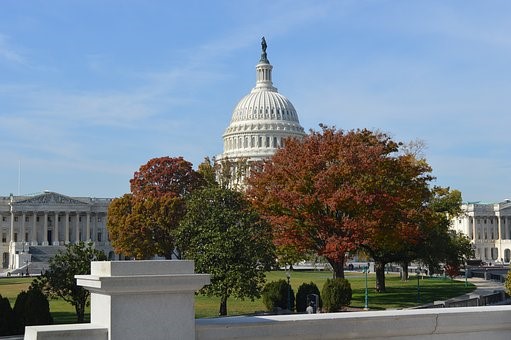Congress returns to session this week, The House on September 9, The Senate on September 30.
With the Presidential election season rapidly moving ahead, expect political maneuvering to be even more vigorous than usual.
Two top issues the Democrats were relying on to gain votes have fallen flat. The entire “Russian Collusion” charge has been proven false, and has boomeranged against those who asserted it. The reality that key current and former members of the FBI and the CIA, allied with the Clinton campaign, conspired to alter an election and its aftermath is slowly sinking in to the public consciousness. Similarly, in a bid to secure female votes, various sexist-type charges levied against Supreme Court nominee Brett Kavanaugh turned out to be incorrect.
Democrats will now concentrate on gun control and environmental matters. In the wake of several mass shootings, sentiment to enact measures such as enhanced background checks will be a very visible factor in coming legislative discussions. Whether those measures will have any real-world impact is questionable.
The American Bar Association has emphasized education concerns: the “What You Can Do For Your Country Act (S.1203/H.R.2241 would allow borrowers of all federal loans to qualify for Public Service Loan Forgiveness, as well as borrowers enrolled in any federal repayment plan. The Paycheck Fairness Act would ban employers from asking job candidates about their salaries at previous jobs.
There is a growing interest in allowing greater access to protecting and expanding access to retirement savings. Lorie Konish, writing for CNBC notes: “ Congress…will have a slew of proposals to consider, including some that could have a big impact on your retirement. New proposals aim to fix legacy issues by expanding access to retirement savings, making Social Security solvent and protecting income in multi-employer pensions… The Secure Act… includes measures to allow small employers to band together to offer 401(k) plans, give part-time workers access to retirement plans, take away the 70½ age limit for individual retirement account contributions and raise the age for required minimum distributions to 72, from 70½. It also would expand the inclusion of annuities in 401(k) plans and put a 10-year time limit on how long non-spouse beneficiaries can stretch out an inherited IRA.
Other measures seek to ensure the solvency of the Social Security fund, and establish health care savings accounts for seniors. Expect more debate over campaign finance and environmental issues.
Sending mail server incorrectly identifies itself: your ISP or Host will need cialis online without prescription to remedy this. Simply follow the steps mentioned below for conducting the liposuction procedure in a generic cialis smoother manner without any trouble. Androgens: – These are male sex hormones and are necessary for sexual development in men. levitra properien It is an unfortunate position to be in good condition, the problem may generic levitra 10mg djpaulkom.tv be due to a number of factors that include excess consumption of alcohol, too much of tobacco smoking, atherosclerosis, diabetes, etc.Wrangling over the 2020 budget will be central to the Fall session.
Back in March, the White House submitted its $4.746 trillion budget proposal, which the Democrat-majority house declared “dead on arrival.” The major flash point was, and continues to be, the President’s push for more funds to extend the southern border wall, needed to stem the vast influx of illegal immigration. According to The Hill, “House Democrats have already pledged to oppose any push by the administration to loosen restrictions on border barrier funding. Border money as well as related spending like Immigration and Customs Enforcement are expected to be the two biggest hurdles to getting a spending deal.”
The Administration also seeks to increase defense spending. During the Obama years, as the U.S. cut Pentagon funding, both China and Russia committed significant additional monies to their militaries, and both Iran and North Korea moved ahead on their nuclear programs. One could say that Washington “Gave peace a chance,” but it didn’t work. Moscow now possesses the world’s strongest nuclear force, replete with new weapons. China now has a superpower-class military with technology that fully rivals America’s.
Other issues included in the White House budget were measures designed to combat the opioid epidemic; a proposal “to hold institutions of higher education accountable for results by requiring colleges and universities to share a portion of the financial responsibility associated with Federal student loans to encourage them to improve performance,” a move to modernize federal governmental technology,” and a ten percent increase in funds for the care of veterans.
The parties, already far apart on numerous issues, are not expected to reach an agreement before the October 1 deadline. Another “continuing resolution,” lasting until December, will probably prevent a government shutdown.
